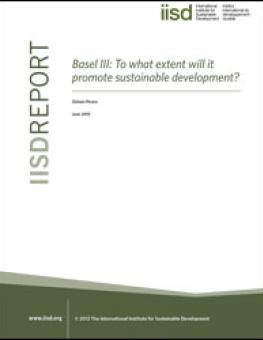
Basel III: To what extent will it promote sustainable development?
Traditionally, banks have been the main pillar of financial intermediation and, consequently, a fundamental source of systemic risk, which in its worst form has resulted in financial crises. In times of economic downturns, financial institutions welcome governmental curative intervention, which in many cases have been misappropriated.
One big intervention was Basel II, which was criticized by many skeptics in the early 2000s and has been accused of having contributed to the late-2000s financial crisis. Basel III has been elaborated on the grounds of the obvious inappropriateness of Basel II.The Basel III framework sets out higher and better-quality capital standards, better risk coverage, leverage ratios as a backstop to the risk-based requirements, measures to promote the build-up of capital that can be drawn down in periods of stress, and the introduction of two global liquidity standards. However, Basel III and its requirements have been questioned. For one thing, Basel III bases its requirements on those formulated in Basel II, possibly still exacerbating financial and monetary imbalances between industrialized and lower-income countries. For another, it creates ambiguities that regulators and the banking industry try to clarify. These pertain to, for instance, new liquidity standards and the containing leverage that may increase capital costs and, potentially, lower profitability. Furthermore, Basel III may create problems for emerging countries, which may face shortened lending volumes, influencing trade dynamics and financial flows between industrialized and emerging economies.
You might also be interested in
Green Public Procurement in India
This report analyzes the status of green public procurement (GPP) in India and suggests key strategies for advancing sustainable procurement practices.
The Role of Multilateral Development Banks for Low-Carbon Procurement in the Infrastructure Sector
This report examines the critical role of multilateral development banks (MDBs) in advancing low-carbon procurement within the infrastructure sector.
Green Public Procurement in Indonesia
This report explores the state of green public procurement (GPP) in Indonesia and offers key strategies for advancing sustainable procurement practices.
Monitoring Progress in Green Public Procurement
This report outlines the importance of monitoring progress in green public procurement (GPP) and highlights various methodologies, challenges, and recommendations.